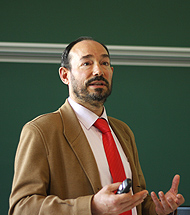"Statistical endorsement of research is practically a requirement of high-impact scientific journals".
The Full Professor of Statistics Jesús López-Fidalgo explained in a seminar of the ICS how statistics work from the perspective of the possible manipulation in the different phases of a study.

"The scientific endorsement of research is practically a requirement of scientific journals". This was stated by the Full Professor of Statistics Jesús López-Fidalgo, director of the School of Industrial Engineering of the University of Castilla-La Mancha, on the occasion of a seminar which he gave at the Institute for Culture and Society (ICS).
In his discussion paper, entitled 'There is no such thing as chance', he explained how statistics work from the perspective of possible manipulation in the process of planning, collecting data, analysis and interpretation.
"In the whole process there are many moments in which there can be some manipulation subject , which can be intentional or not," he said. In this sense, he insisted that on many occasions there is no intention to deceive, but rather a problem of "lack of training in statistics or that it has not been possible to have the support of a specialist, since there are few graduates and they are in great demand".
"Statistics should be part of the general culture."As an example of manipulation, he mentioned that in the collection phase, the data can be modified or some that do not fit or are too extreme can be suppressed. However, he recalled that statistics itself "has procedures to detect possible traps and that they are based on the intrinsic beauty of the real data ".
On the other hand, he pointed out that it can also happen that an inappropriate analysis subject is chosen, such as trying to repeat an analysis carried out by some researchers by adapting it to a different context in which such analysis is no longer valid.
The Full Professor commented that interpretation is perhaps the phase where there is most room for intentional manipulation: "There are cases in which the statistical results do not reveal what the researchers want, so they decide not to mention them".
Finally, Professor López-Fidalgo stressed that the best way for citizens to protect themselves from the manipulation of data is for statistics to become part of the general culture: "Just as we know where a river is born or who reigned at a certain moment in history, citizens should know basic concepts of statistics. This would help them a lot in their daily lives and would help them to have a critical spirit in the face of the information they receive, which is sometimes very sensationalist".
